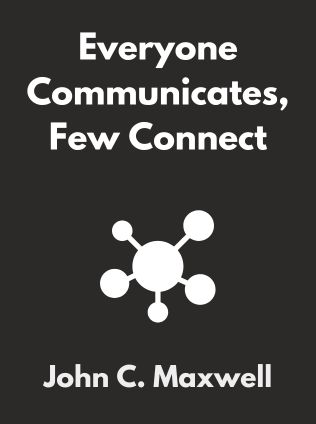
Everyone Communicates, Few Connect
What the Most Effective People Do Differently
By John C. Maxwell
Published 03/2010
About the Author
John C. Maxwell is an internationally renowned leadership expert, speaker, and author who has sold over 18 million books. His notable works include Developing the Leader Within You, The 21 Irrefutable Laws of Leadership, and The 21 Indispensable Qualities of a Leader. Maxwell founded EQUIP, a nonprofit organization that has trained more than 5 million leaders in 126 countries. His insights on leadership can be accessed on his blog at JohnMaxwellonLeadership.com.
Main Idea
In Everyone Communicates, Few Connect, John C. Maxwell emphasizes the crucial difference between merely communicating and truly connecting with others. According to Maxwell, connection is essential for effective communication and leadership, and it significantly impacts success in personal, professional, and family relationships. He presents a methodology comprising Five Principles and Five Practices to help individuals learn and master the art of connection.
Table of Contents
- Prologue
- Connecting Principles
- Connecting Increases Your Influence in Every Situation
- Connecting is All About Others
- Connecting Goes Beyond Words
- Connecting Always Requires Energy
- Connecting is More Skill Than Natural Talent
- Connecting Practices
- Connectors Connect on Common Ground
- Connectors Do the Difficult Work of Keeping it Simple
- Connectors Create an Experience Everyone Enjoys
- Connectors Inspire People
- Connectors Live What They Communicate
Prologue
Maxwell begins by highlighting the frustration of a dropped phone call to illustrate the importance of connection. He draws parallels between technological disconnections and interpersonal communication, emphasizing that connection is fundamental in communication. He poses critical questions to help readers recognize when they are genuinely connecting with others.
Connecting Principles
Connecting Increases Your Influence in Every Situation
Maxwell asserts that the ability to connect with others enhances one's influence, which is pivotal for success. Effective communication and leadership hinge on this connection. He quotes President Gerald Ford, who stressed the importance of learning to write and speak effectively:
"Nothing in life is more important than the ability to communicate effectively." - Gerald Ford
To connect, one must focus on others, expand their vocabulary beyond words, marshal their energy for connecting, and gain insights into how great connectors operate. Maxwell emphasizes five practical skills for connection:
- Finding common ground
- Keeping communication simple
- Capturing people's interest
- Inspiring others
- Staying authentic
Connecting is All About Others
Maxwell stresses that true connection focuses on others, not oneself. He explains that understanding and communicating a selfless attitude is essential. People ask three questions when interacting:
- "Do you care for me?"
- "Can you help me?"
- "Can I trust you?"
Answering these questions affirmatively helps build connection, communication, and interaction. Maxwell cites the work of Jeffrey Gitomer who emphasizes that trust is even more vital than love in building successful relationships.
Connecting Goes Beyond Words
Maxwell references a study by UCLA's Albert Mehrabian, which shows that face-to-face communication is composed of words (7%), tone of voice (38%), and body language (55%). Therefore, effective communication transcends words. Maxwell identifies four components of connection:
- Visual: Ensuring appropriate visual impression
- Intellectual: Knowing the subject and oneself
- Emotional: Conveying positive attitude
- Verbal: Effective use of words and voice
In practical terms, this means paying attention to your appearance, ensuring clarity of message, expressing genuine emotion, and using your voice effectively. Maxwell explains that how we say things and our body language often speak louder than the words themselves.
Connecting Always Requires Energy
Effective connection demands energy, which must be used strategically. Maxwell outlines five ways to proactively use energy for connection:
- Initiative: Go first and overcome awkwardness.
- Clarity: Be prepared and clear in communication.
- Patience: Slow down and go at others' pace.
- Selflessness: Give your all in interactions.
- Stamina: Recharge to maintain energy levels.
Maxwell emphasizes that taking initiative can often feel uncomfortable, but it is necessary to make connections. Preparation helps in bringing clarity to your communication, and patience allows you to engage others at their pace. Selflessness involves giving your full attention and effort, while stamina requires recharging to keep your energy levels high for effective communication.
Connecting is More Skill Than Natural Talent
Maxwell encourages readers to become students of communication, studying effective and ineffective speakers to learn what works. Connecting effectively involves:
- Having interest in the person
- Valuing the person
- Prioritizing their interests
- Expressing gratitude
Maxwell notes that connecting is a skill that can be developed through practice and observation. He advises paying attention to how effective connectors interact with people and practicing those skills in various settings, from one-on-one conversations to group interactions and public speaking.
Sign up for FREE and get access to 1,400+ books summaries.
You May Also Like
The Subtle Art of Not Giving a F*ck
A Counterintuitive Approach to Living a Good Life
By Mark MansonRich Dad Poor Dad
What the Rich Teach Their Kids About Money - That the Poor and Middle Class Do Not!
By Robert T. KiyosakiHow To Win Friends and Influence People
The All-Time Classic Manual Of People Skills
By Dale CarnegieQuiet: The Power of Introverts
The Power of Introverts in a World That Can't Stop Talking
By Susan Cain



















